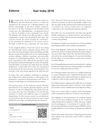 22 citations,
June 2012 in “PLOS ONE”
22 citations,
June 2012 in “PLOS ONE” Cholesterol-related compounds can stop hair growth and cause inflammation in a type of scarring hair loss.
 20 citations,
May 2020 in “Experimental Dermatology”
20 citations,
May 2020 in “Experimental Dermatology” Aging scalp skin contributes to hair aging and loss, and more research is needed to develop better hair loss treatments.
 14 citations,
July 2019 in “Experimental and Molecular Medicine”
14 citations,
July 2019 in “Experimental and Molecular Medicine” Nanog gene boosts stem cells, helps hair growth, and may treat hair loss.
13 citations,
May 2021 in “FASEB bioAdvances” Plant-based products can improve hair and skin health without harmful side effects.
11 citations,
March 2021 in “Cleveland Clinic Journal of Medicine” Treating hair loss in both men and women is effective and improves quality of life.
 11 citations,
October 2018 in “The Journal of Dermatology”
11 citations,
October 2018 in “The Journal of Dermatology” Decorin helps keep hair follicle stem cells and may prevent age-related hair loss.
 10 citations,
June 2016 in “Wound Repair and Regeneration”
10 citations,
June 2016 in “Wound Repair and Regeneration” The microenvironment, especially mechanical forces, plays a crucial role in hair growth and could lead to new treatments for hair loss.
 9 citations,
January 2005 in “Experimental dermatology”
9 citations,
January 2005 in “Experimental dermatology” Melatonin receptors in hair follicles help regulate hair growth and could treat hair loss.
 8 citations,
March 1979 in “International Journal of Dermatology”
8 citations,
March 1979 in “International Journal of Dermatology” Dr. Vera H. Price's 1979 work emphasizes the importance of accurate diagnosis and personalized treatment for hair loss.
 7 citations,
January 1981 in “Springer eBooks”
7 citations,
January 1981 in “Springer eBooks” The document concludes that hair biology is complex and there are still unanswered questions about hair loss and follicle changes.
 5 citations,
February 2019 in “Oral and Maxillofacial Surgery”
5 citations,
February 2019 in “Oral and Maxillofacial Surgery” Hair loss can be reversed or even cured using advanced hair restoration techniques, with rare complications like swelling and bleeding.
 4 citations,
January 2019 in “Annals of Dermatology”
4 citations,
January 2019 in “Annals of Dermatology” RE-ORGA, a Korean herb extract, may help prevent hair loss.
 4 citations,
January 2016 in “Postepy Dermatologii I Alergologii”
4 citations,
January 2016 in “Postepy Dermatologii I Alergologii” Many hair diseases, including those caused by medications and psychological issues, can lead to hair loss and require proper treatment and specialist care.
 3 citations,
May 2018 in “Journal of nutritional health & food science”
3 citations,
May 2018 in “Journal of nutritional health & food science” Nutritional supplements can help manage hair loss and promote hair growth by strengthening hair roots and countering harmful effects of pollution, smoking, and deficiencies in vitamins and minerals.
 3 citations,
January 2012 in “Wageningen Academic Publishers eBooks”
3 citations,
January 2012 in “Wageningen Academic Publishers eBooks” Hair health depends on various factors and hair loss can significantly affect a person's well-being; understanding hair biology is key for creating effective hair care treatments.
 3 citations,
December 2008 in “The American Journal of Cosmetic Surgery”
3 citations,
December 2008 in “The American Journal of Cosmetic Surgery” Hair transplantation has evolved to refined techniques like FUE and FUT, with Finasteride and Minoxidil as the only other proven treatments for hair loss.
 2 citations,
January 2010 in “International Journal of Trichology”
2 citations,
January 2010 in “International Journal of Trichology” The Hair India 2010 conference introduced a new hair loss classification and highlighted advanced diagnostic techniques in trichology.
 1 citations,
March 2022 in “Daehanhanuihakoeji”
1 citations,
March 2022 in “Daehanhanuihakoeji” Artemisia sieversiana extract may help prevent hair loss and promote hair growth.

Maintaining enough zinc may help prevent and manage hair loss.
February 2024 in “Animals” Hair loss peaks in spring and regrowth in late summer, with pregnant females losing the most hair.
 January 2024 in “International journal of chemical research and development (Print)”
January 2024 in “International journal of chemical research and development (Print)” Low levels of vitamin B12, iron, ferritin, and zinc are linked to hair loss in Iraqi women.
 September 2023 in “Nature Communications”
September 2023 in “Nature Communications” Rare genetic variants in five specific genes are linked to male-pattern hair loss but only account for a small part of the risk.
 August 2023 in “Journal of Cosmetic Dermatology”
August 2023 in “Journal of Cosmetic Dermatology” Both minoxidil-spironolactone and minoxidil-finasteride treatments work for hair loss, but minoxidil-spironolactone is slightly more effective, especially in women.
 August 2023 in “Stem Cell Research & Therapy”
August 2023 in “Stem Cell Research & Therapy” A substance called Cell-free fat extract can effectively treat common hair loss by increasing hair growth and density.
 May 2023 in “Archives of dermatological research”
May 2023 in “Archives of dermatological research” Some factors like thyroid disease, diabetes treatment, hair dryers, natural hairstyles, and scalp conditions can affect the treatment results for a hair loss condition called CCCA.
 October 2022 in “The Egyptian Journal of Hospital Medicine”
October 2022 in “The Egyptian Journal of Hospital Medicine” Diffuse hair loss in women is often linked to thyroid problems.
 August 2022 in “Our Dermatology Online”
August 2022 in “Our Dermatology Online” The conclusion is that examining the scalp closely and checking for iron levels and thyroid issues is key to understanding chronic hair loss in women.
 December 2021 in “Journal of clinical images and medical case reports”
December 2021 in “Journal of clinical images and medical case reports” PRP generally shows better results for hair regrowth than mesotherapy, but more research is needed.
 October 2021 in “Cosmoderma”
October 2021 in “Cosmoderma” Hair loss can be managed with treatments like minoxidil, finasteride, and others, but there are still gaps in effectiveness and off-label usage is increasing.
 January 2015 in “Journal of clinical & experimental dermatology research”
January 2015 in “Journal of clinical & experimental dermatology research” A protein combining parathyroid hormone and collagen helped hair regrow in mice with a hair loss condition.



























